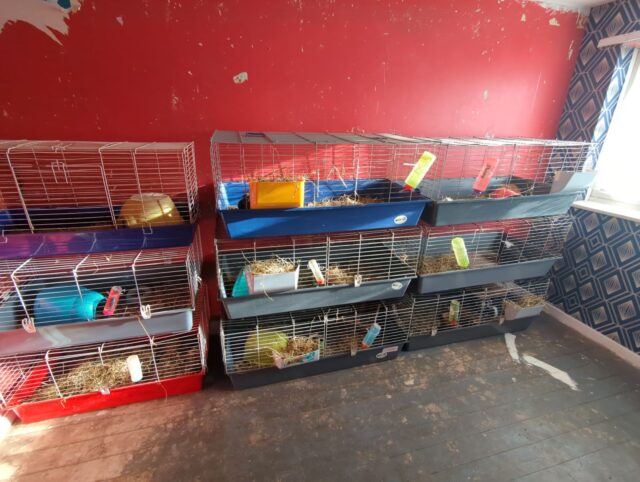The RSPCA says rabbit owners need to stop packing their rabbits into small hutches and cages so they can truly thrive.
In Rabbit Awareness Week (June 24-28) the animal charity and its partners are urging owners to review the living accommodation they provide for their bunnies so they can hop, jump and run to their hearts’ content.
Rabbits need to be able to express their natural behaviours and they can only do so if they have plenty of room to exercise, as well as shelter from the elements and the threat of predators.
But the RSPCA has been called out to many properties where rabbits have been kept in squalid and cramped conditions, and often left to lead lonely lives in small cages packed one on top of the other.
RSPCA Kent North West Branch is currently seeking new homes for three rabbits who were victims of such dreadful living conditions.
Cloud was rescued by RSPCA inspectors after having been kept with other rabbits in small cages stacked in a barren room (pictured above) as their owners became overwhelmed by the number of pets they were caring for. As a result of the lack of space she used to live in, Cloud continues to make small circular movements although she now has plenty of space to enjoy in her enclosure at the Dartford-based animal centre.
Winnie was rescued from a property in Bedworth, Warwickshire when 20 rabbits and an Akita dog were found neglected in December last year. The rabbits were crammed into five small, filthy cages stacked on top of each other and several of them were suffering with fur loss. A part of one of Winnie’s ears was found to be missing.
She has recovered in the care of the RSPCA and gave birth to offspring, including Mango (both pictured) who is still with her. Staff at the Kent branch are looking to rehome mother and daughter together because of their close bond.
Branch manager Becky Blackmore said: “There are so many rabbits who are being kept in wholly inappropriate accommodation because their owners are unaware of just how much space is needed so that they can exercise and rest properly.
“Cloud came to us after being rescued from poor conditions in which she was living in a small cage. Although she now has plenty of space to move and play she is still doing small repetitive circles. But she is getting better every day and now nudges us for head strokes. She will need time to adjust to proper living conditions with kind new owners as she has been looked after so poorly.
“Winnie too was found in overcrowded conditions and gave birth soon after she came into our care. All of her babies have been rehomed, apart from Mango, who six months on is still in our care with Winnie. We were planning to split mother and daughter, but their bond is really strong and we would love to find them a home together. Winnie has part of her ear missing but we think they are a beautiful pair of bunnies.
“It is so important that people research the needs of rabbits before they become owners, particularly where their new pets are going to live. Rabbits can live for a long time and can be costly. They need much more than just a hutch at the end of the garden – they need space, companionship and enrichment to live happy and healthy lives.”
To ensure rabbits have enough space to thrive the RSPCA recommends that a medium-sized pair of rabbits are provided with accommodation measuring three metres by two metres and one metre high, as a minimum.
The animal charity does not believe typical rabbit hutches provide the amount of space rabbits need. To help give them as much space as possible owners may even consider using children’s playhouses or sheds as rest areas and attaching them to large, secure areas where they can exercise freely. Alternatively, a shelter could be placed inside a large exercise run.
If rabbits are kept indoors then they should have an indoor pen or even a rabbit-proofed room which is free of dangers such as wires and cables.
During Rabbit Awareness Week owners can download a digital pack full of advice, which includes tips on how to provide the best living environment for their pet rabbits.
There is also more advice about housing rabbits at the RSPCA’s website.
In 2022 RSPCA Kent North West Branch built its own dedicated accommodation for rabbits because of the large numbers that were coming into its care.
While there has been a fall in the numbers arriving at RSPCA national centres this year (up to the end of May) from 401 down to 264 for a similar period in 2023, there are still many rabbits waiting for new homes in private boarding accommodation (155 compared to 299) as rehoming rates from centres fall.
Between 2019 and 2023 the numbers of rabbits rehomed from RSPCA national centres dropped by 25%. Many rabbits are now left waiting for their new homes for months and even years.
Among them is veteran rabbit Edward, who came into the Kent North West Branch in a dreadful state. He was underweight, flea-ridden and with overgrown claws. After plenty of TLC his health has vastly improved and the branch is looking for new owners who can help him continue his recovery.
Columbus has been with RSPCA Crewe, Nantwich and District Branch for around nine months. The buck, whose age is unknown, was found as a stray but sadly, so far, there has been no interest in him, so his quest for his fur-ever home goes on. The lop rabbit is very chilled and has loved snuggling with his foster carer. The branch would like to rehome him with an owner who can provide him with a companion.
To mark the RSPCA’s special anniversary the animal welfare charity wants to inspire one million people to join their movement to improve animals’ lives. To find out how you can join their million-strong movement for animals visit www.rspca.org.uk/200.




